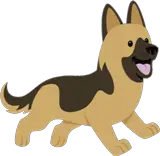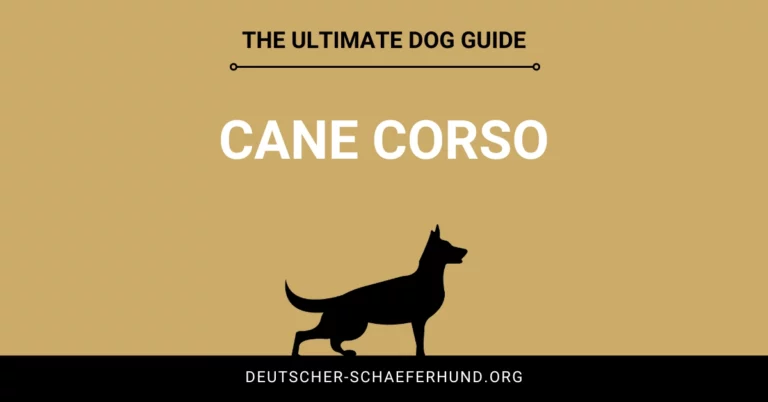Introduction
The Cane Corso, also known as the Italian Mastiff, is a powerful dog breed that’s known for its strength, loyalty, and protective nature. These dogs are imposing creatures, boasting a muscular bodies and a distinctively noble bearing. Originally from Italy, they were bred as working dogs for tasks such as hunting, guarding, and farming. Their versatility and endurance have given them a storied history that stretches back to ancient times.
| Attribute | Description |
|---|---|
| Breed | Cane Corso (Italian Mastiff) |
| Size | Large |
| Weight Range | 88-110 pounds (females), 99-110 pounds (males) |
| Height Range | 23.5 – 26 inches (females), 25 – 27.5 inches (males) |
| Life Span | 10-12 years |
| Coat Type | Short and dense |
| Exercise Needs | High |
| Dietary Needs | High-quality dog food suitable for large breeds |
| Temperament | Loyal, Protective, Intelligent |
| Common Health Issues | Hip Dysplasia, Heart Conditions, Eye Disorders |
Characteristics of Cane Corso
Physical attributes
Cane Corsos have a robust and athletic build. They’re large dogs, with males standing between 25 to 27.5 inches and females between 23.5 to 26 inches at the shoulder. Their coat is short, and dense, and comes in a variety of colors, including black, fawn, and gray.
Personality traits
A well-bred Cane Corso should be confident and calm. They’re known for their intelligence and eagerness to please, which makes them relatively easy to train compared to other breeds.
Temperament
Despite their imposing size, they’re usually very loving with their families. Cane Corsos are known for their loyalty and protective nature. However, they can be aloof around strangers.
Lifespan and health
On average, a Cane Corso will live between 10 to 12 years. Like many large breeds, they can be prone to certain health conditions such as hip dysplasia, heart problems, and eye conditions.
Care and Maintenance of Cane Corso
Exercise requirements
As a highly active breed, the Cane Corso requires daily exercise to keep their muscles toned and to prevent boredom.
Dietary needs
The Cane Corso should be fed a balanced diet that’s appropriate for their size and activity level.
Grooming
Despite their short coat, the Cane Corso does shed. Regular brushing will help keep shedding to a minimum.
Common health issues and preventive measures
Regular vet check-ups are essential to ensure the Cane Corso remains healthy. It’s also important to maintain their dental health and keep them up-to-date on vaccinations.
Training a Cane Corso
Training methods and tips
Training should begin early for the Cane Corso. Using positive reinforcement techniques can yield excellent results.
Socialization
Like all dogs, Cane Corsos need to be well-socialized from a young age. This helps them to develop into well-rounded dogs.
Dealing with behavioral problems
If behavioral issues arise, they can often be addressed with consistent, firm, but gentle guidance.
Living with a Cane Corso
Compatibility with families and children
Despite their size, Cane Corsos are known to be good with children. They are protective and patient, but interaction should always be supervised.
Compatibility with other pets
Cane Corsos can get along well with other pets, especially if they have been raised together. However, care should be taken when introducing a Cane Corso to smaller animals.
Housing requirements – apartment or house?
Cane Corsos can adapt to living in an apartment if they get enough exercise. However, a house with a yard is often a better fit for this large, active breed.
The Cane Corso as a Working Dog
Cane Corso in protection and security roles
Thanks to their intelligence, physical power, and natural protective instinct, Cane Corsos excel in protection and security roles.
Cane Corso in sports and other activities
Cane Corsos can also be trained for various dog sports, such as obedience, tracking, and agility competitions.
Finding a Cane Corso
Choosing a reputable breeder
It’s essential to find a reputable breeder when looking to buy a Cane Corso puppy.
Understanding breeder certifications
Reputable breeders will be able to provide certification about the puppy’s lineage and health clearances.
Adoption options
Adoption is another wonderful way to get a Cane Corso. There are many rescue organizations that have Cane Corsos looking for homes.
Price range and what it includes
The price for a Cane Corso puppy can vary widely, depending on factors such as the pedigree, the breeder’s reputation, and location.
Traveling with a Cane Corso
Preparation and Considerations
Traveling with a Cane Corso, whether it’s a quick trip to the vet or a long-distance journey, requires some preparation. Due to their size, you’ll need a large, sturdy crate for transportation. It’s important to make sure your dog is comfortable and secure during the journey. Make frequent stops for exercise and bathroom breaks, and ensure your dog has access to water during the trip.
Bonding with Your Cane Corso
The Importance of a Strong Relationship
Building a strong bond with your Cane Corso is crucial for a happy and healthy relationship. Spending time together, whether it’s during training sessions, walks, or just cuddling on the couch, strengthens this bond. Remember, these dogs are naturally protective and will be loyal to you, so nurturing this bond is essential for their well-being and happiness.
Activities Suitable for a Cane Corso
Keeping Your Cane Corso Engaged
Cane Corsos are active and intelligent dogs that require mental and physical stimulation. Besides regular walks and training sessions, consider activities like tug-of-war games, fetch, or even agility training. These types of activities can keep your Cane Corso engaged and mentally stimulated.
Community Involvement
Joining a Cane Corso Community
There are many communities and clubs dedicated to the Cane Corso breed. Joining a club or an online community can provide invaluable resources, advice, and support for Cane Corso owners. It can also provide opportunities for socialization for your dog.
The Cane Corso’s Origins
The Ancestry of Cane Corso
The lineage of Cane Corsos can be traced back to the ancient Roman war dogs that were used in battles. Over the centuries, their ancestors were developed into a breed known as the Molossus, which was then divided into lighter and heavier versions. The lighter ones were the direct ancestors of the modern-day Cane Corso.
Weather Protection for Cane Corso
Shielding Your Cane Corso from the Elements
While Cane Corsos can adapt to a range of climates, they need protection from extreme weather. In colder climates, they may need a doggie jacket or sweater. In hotter weather, they can suffer from overheating, so make sure they have access to shade and plenty of fresh water.
Cane Corso and Water Activities
Swimming and Other Aquatic Exercises
Cane Corsos can learn to enjoy water and swimming. This can be a great way to cool off in summer, plus swimming is an excellent low-impact exercise for these large dogs. Always supervise your Cane Corso around water, and never force them if they seem fearful.
Advanced Training Opportunities
Continued Learning for Your Cane Corso
While Cane Corsos can pick up basic obedience quite quickly, there are many opportunities for advanced training. These might include search and rescue work, advanced obedience, or even training for dog shows if your Cane Corso is a purebred specimen.
Conclusion
This guide has taken us on a journey through the remarkable world of the Cane Corso breed. Their striking appearance, loyal disposition, and robust athleticism make them a truly unique breed. Owning a Cane Corso can bring a great deal of joy, but it’s also a commitment to their care, training, and well-being. Owning a Cane Corso is not a commitment to be taken lightly. These magnificent dogs deserve an owner who understands and respects their needs and characteristics. By providing them with a loving environment, a balanced diet, regular exercise, appropriate training, and healthcare, they can flourish and become an inseparable member of your family.



